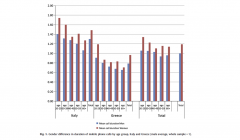“Do Women have longer Conversations? Telephone Evidence of Gendered Communication Strategies”, Journal of Economic Psychology, December 2010. doi:10.1016/j.joep.2010.12.008. (with Guido Friebel) [ Download PDF ]


“Do Women have longer Conversations? Telephone Evidence of Gendered Communication Strategies”, Journal of Economic Psychology, December 2010. doi:10.1016/j.joep.2010.12.008. (with Guido Friebel) [ Download PDF ]

Le Club des Incorrigibles Optimistes, by Jean-Michel Guenassia. Published August 2009 by Albin Michel.
Wonderful account of an adolescence in early 1960s Paris, by a boy who comes across a chess club frequented by Jean-Paul Sartre, Joseph Kessel and a cast of East European émigrés who all have shadows they would prefer to escape. The book is sad, evocative and sometimes side-splittingly funny. I particularly loved the description of a supercilious Air France employee refusing to help a Russian pilot who has been diverted to Orly because of fog (I could just see that single raised eyebrow the Air France staff have been trained to deploy so deftly). The hero, a 12-year old boy who walks around the streets of Paris reading, insists he is in no danger of running into a car or another pedestrian because he can rely on everyone else’s interest in avoiding him. Until the day when he crashes into a teenage girl who is also holding a book in front of her nose. It turns out to be a great way to meet girls who share his literary passions.
Tags: Fiction, Français

A Pleur-Joie
By Elvire de Brissac. Published 1969 by Grasset.
The other other woman writes acutely and movingly about being mistress to a man with not only a wife but an established mistress as well. Funny, sad, sharp as a razor.
Tags: Fiction, Français
In recent years there has been increased public discussion of the possibility that economists doing research on, and giving advice to policymakers about, important questions of public concern, may face conflicts of interest because they depend for information, research funds, data, consultancy income or other direct or indirect benefits on parties with an interest in influencing such research and policy advice. I believe these concerns are justified and that it is reasonable to require researchers to be transparent about their potential conflicts. These may arise with respect to both public and private sources of benefits and both financial and non-financial types of benefit. I endorse the statement of the American Economic Association relating to disclosure of potential conflicts, and I have written in the press here and here about some of the issues such conflicts raise.
In this spirit, here is a list of institutions other than my employer from which I have received, directly or indirectly, benefits (other than travel expenses) with a value of 1000 Euros or more at any time since 2006, including data, royalty income, honoraria for speaking engagements and consultancy fees. Where these benefits are relevant to published research or other publications I have declared and will continue to declare them in the publications concerned.
Agence Française du Développement, Boardex, Bombardier, Broadcomm, BRUEGEL, BSkyB, Charles River Associates, European Commission (DG-Competition), European Patent Office, European Round Table of Industrialists, HSBC, IESE Business School, Ifo Institute, Institut d’Economie Industrielle, Japan Cabinet Office, Keystone Associates, Microsoft, Ministère de l’Enseignement Supérieur et de la Recherche, Le Monde, NEC, News International, Nokia, Outokumpu, Panasonic, Pfizer, Princeton University Press, REEL, SFR, Shire HGT, St. Gobain, Sony-Ericsson, SwissRe, T3 Technologies, Texas Instruments, Thomson Reuters, Time Warner, Unibail.
In addition I have received datasets from two firms that gave them to me under conditions of anonymity and which were used in my paper with Guido Friebel: “Do Women have longer Conversations? Telephone Evidence of Gendered Communication Strategies”, Journal of Economic Psychology, December 2010. doi:10.1016/j.joep.2010.12.008.
The paper did not discuss any issues relating to the commercial or other interests of these firms, and I have not otherwise written or spoken on any such matter.
Economist Paul Seabright shows how an awareness of the fragility of our social institutions and their roots in our evolutionary past can help us deal with the challenges of today’s globally networked world.

Paul Seabright, “Darwin and Human Society”, in Darwin: Darwin College Lectures, collection Cambridge University Press, 2010, p. 78-103.
Charles Darwin can easily be considered one of the most influential scholars of his time. His thoughts, ideas, research and writings have had a far reaching impact and influence on modern thought in the arts, on society, and in science. With contributions from leading scholars, this collection of essays explores how Darwin’s work grew out of the ideas of his time, and how its influence spread to contemporary thinking about creationism, the limits of human evolution and the diversification of living species and their conservation. A full account of the legacy of Darwin in contemporary scholarship and thought. With contributions from Janet Browne, Jim Secord, Rebecca Stott, Paul Seabright, Steve Jones, Sean Carroll, Craig Moritz and John Dupré. This book derives from a highly successful series of public lectures, revised and illustrated for publication under the editorship of Professor William Brown and Professor Andrew Fabian of the University of Cambridge.


The Institutional Economics of Foreign Aid. Bertin Martens, Uwe Mummert, Peter Murrell, Paul Seabright, Elinor Ostrom, Cambridge University Press, 2001.
This book analyzes the institutions–incentives and constraints–that guide the behavior of persons involved in the implementation of aid programs. While traditional performance studies tend to focus almost exclusively on policies and institutions in recipient countries, the authors look at incentives in the entire chain of organizations involved in the delivery of foreign aid, from donor governments and agencies to consultants, experts and other intermediaries. They examine incentives inside donor agencies, the interaction of subcontractors with recipient organizations, incentives inside recipient country institutions, and biases in aid performance monitoring systems.

 The Economic Regulation of Broadcasting Markets: Evolving Technology and Challenges for Policy, Cambridge University Press, 2007.
The Economic Regulation of Broadcasting Markets: Evolving Technology and Challenges for Policy, Cambridge University Press, 2007.
New technology is revolutionizing broadcasting markets. As the cost of bandwidth processing and delivery fall, information-intensive services that once bore little economic relationship to each other are now increasingly related as substitutes or complements. Television, newspapers, telecoms and the internet compete ever more fiercely for audience attention. At the same time, digital encoding makes it possible to charge prices for content that had previously been broadcast for free. This is creating new markets where none existed before. How should public policy respond? Will competition lead to better services, higher quality and more consumer choice – or to a proliferation of low-quality channels? Will it lead to dominance of the market by a few powerful media conglomerates? Using the insights of modern microeconomics, this book provides a state-of-the-art analysis of these and other issues by investigating the power of regulation to shape and control broadcasting markets.

Pontus Brunerhjelm, Riccardo Faini, Victor Norman, Frances Ruane and Paul Seabright, Integration and the Regions of Europe: How the Right Policies can Prevent Polarisation, Center for Economic Policy Research, London, 2000.
This report analyses how the geographic pattern of production and employment in Europe will be affected by market integration, increased direct investment, more mobile financial capital and a sharper, global division of labour. The authors then trace the implications of such changes for local policy (local tax, expenditure and industrial policy) and finally discuss how the subsidiary principle should be implemented to ensure that local policies contribute to overall economic efficiency and other common goals.